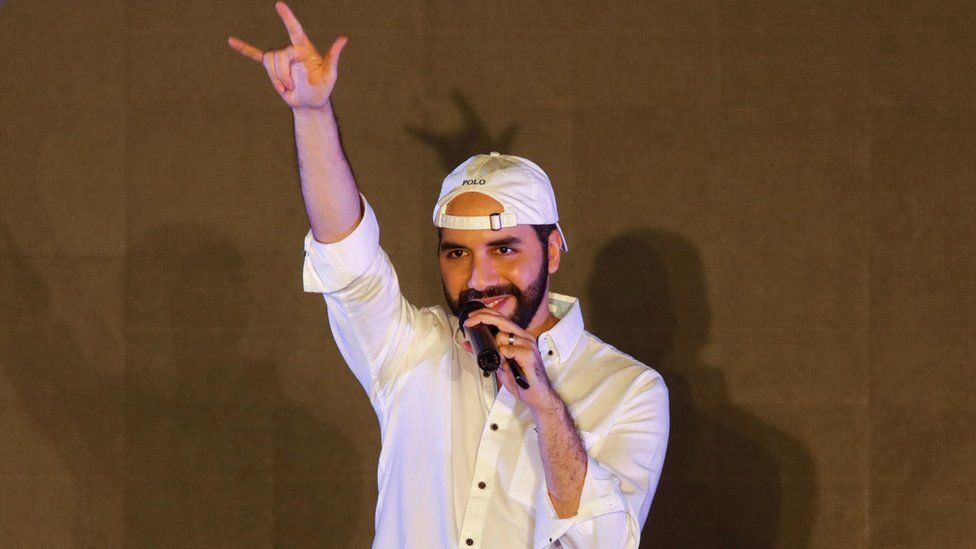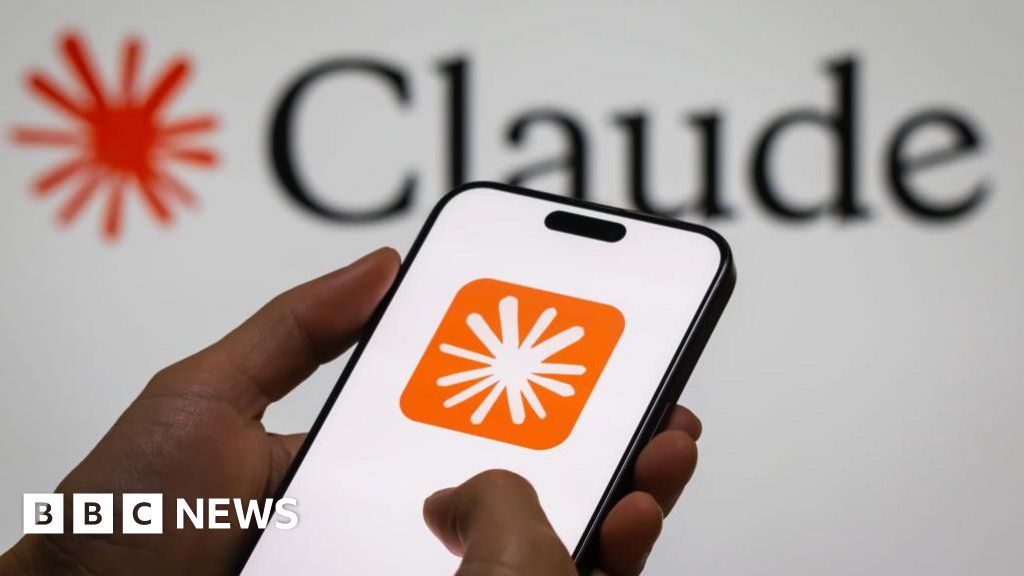ARTICLE AD BOX
 Image source, Reuters
Image source, Reuters
President Nayib Bukele plans to build a city called Bitcoin City, as he pushes his nation to use the digital currency
By Joe Tidy & Cecilia Barría
BBC News
El Salvador's president is celebrating after a Bitcoin reserve he bought with public money has entered the black amid the continuing Bitcoin price rise.
Since 2021, Nayib Bukele has spent more than $120m (£95m) of his impoverished nation's money buying Bitcoin.
"Issue retractions and offer apologies," he urged his critics on X, formerly known as Twitter.
But economists say it is too early to celebrate his high-risk bet at the centre of a drive for Bitcoin adoption.
'Hit pieces'
Mr Bukele stepped down as president this week to campaign for a controversial second term he is largely expected to win as his popularity in the central American country remains high.
According to a website tracking his Bitcoin portfolio, the 2,764 coins he bought became worth more than he paid for them, on Tuesday afternoon. And if he sold them at the time of writing, he could make about $3.7m.
The figures have been estimated solely from Mr Bukele X posts announcing each purchase. And the unknown creators of the website could not be reached for comment.
Mr Bukele posted a picture of the website's graph declaring his success, on Monday - but X users noticed a mistake in the maths and the milestone was actually reached 24 hours later.
"El Salvador's Bitcoin investments are in the black," Mr Bukele posted.
There had been "literally thousands of articles and hit pieces that ridiculed our supposed losses", he said. "It is important that the naysayers and the authors of those hit pieces take back their statements."
Mr Bukele's posts have mostly met with praise, as Bitcoin enthusiasts celebrate what they say is vindication of his foresight and the potential of digital currencies.
'Intense red'
At one stage, Mr Bukele's bitcoins were worth half of what he paid for them. But in the past week, the price has risen to $44,000 a coin, which is being put down to potential changes in financial rules around cryptocurrency in the US.
But some economists in El Salvador and elsewhere say the moment is not as significant as Mr Bukele would like.
The $120m his government has spent on buying coins is only a portion of the public funds used to promote Bitcoin to Salvadoreans since the country became the first to make it legal tender in parity with the US dollar, the country's primary money.
"The government spent a lot of money on the development of the Chivo Wallet application, on the installation of ATMs, which mostly do not work, on a $30 bonus for all citizens over 18 years of age, on propaganda and international events," Oscar Picardo, director of the Institute of Sciences at the Francisco Gavidia University, in San Salvador, El Salvador, says.
"When you add up all the expenses, the result cannot be positive. The result is in red - and in intense red."
In June, a BBC documentary about Bitcoin take-up in El Salvador found most of the population were using the digital currency less than Mr Bukele and other Bitcoin enthusiasts wanted, despite heavy investment.
Image source, Reuters
Image caption,The move means Bitcoin will be accepted everywhere for goods and services, alongside the US dollar
Independent Salvadorean economist Tatiana Marroquin says: "Bukele's victorious tone about the increase in the price of Bitcoin, it is quite illusory.
"It doesn't offset the economic costs of the Bitcoin project."
About $200m of public money has been spent trying to persuade citizens to embrace the digital currency, Ms Marroquin says.
"It's a total failure," she says. "Almost no-one in El Salvador uses Bitcoin - not even in tourism does it seem to be an attraction."
Lourdes Molina, senior economist at the Central American Institute of Fiscal Studies (ICEFI) think tank, agrees Bitcoin adoption, meant to cut the cost of transferring money abroad, has fallen in recent months, despite the rise in the value of the coins, as Salvadoreans rely on the stability of dollars in cash form.
"In a context of extreme poverty and food insecurity that continue to increase, allocating public resources to this speculation has a social cost," she says.
"Those public funds could have been used to guarantee basic rights of the Salvadoran population, such as the right of access to food or a decent income."
Image source, Reuters
Image caption,Mr Bukele's strict crackdown on gangs in the country has made him increasingly popular with citizens
Economists have also discussed a lack of transparency. No public body tracks spending on Bitcoin or the status of Mr Bukele's $100m reserves.
"There is no official information other than President Bukele's Tweets," Frank Muci, policy fellow at the London School of Economics and Political Science's School of Public Policy, says. And providing a Bitcoin block-chain wallet address would "trivially prove that the government controls the bitcoin they claim to own at zero cost".
Even some Bitcoin enthusiasts are critical about the lack of information.
"It's very unfortunate that they aren't disclosing their Bitcoin accounting in a formal way," crypto investor Pledditor said on X.
"Somehow, it's more opaque than America's gold in Fort Knox."
Mr Bukele's office did not respond to requests for comment or information.
The Bitcoin Standard author Dr Saifedean Ammous, reportedly appointed as economic adviser for Bitcoin to the Bukele government in May, did not respond to questions about the lack of transparency but said the Bitcoin reserve rising in value was a moment to celebrate.
"It is significant that Bitcoin and El Salvador's investment have recovered after two years under water, because politicians, economists and international organizations had repeatedly branded Bukele and his Bitcoin policy failures because the price had dropped," he said. And the milestone showed Bitcoin offered a compelling alternative to national currencies and government bonds, which constantly declined in value.
"It is also common to dismiss El Salvador's Bitcoin strategy based on short-term concern with adoption for consumer payments - but that misses the bigger picture," Dr Ammous said.
"Far more important than consumer payments is the role Bitcoin can play in economic independence and El Salvador's treasury, where it offers a reserve asset that appreciates over time and has a large, and growing, global liquidity pool."
Mr Bukele has repeatedly criticised institutions such as the International Monetary Fund (IMF), which warned him about the risks the cryptocurrency posed to El Salvador, stressing it would be difficult to get a loan from the institution.
The IMF did not send a comment about the latest news.
Mr Bukele acknowledged the price of Bitcoin would continue to fluctuate - but he has no plans to sell the reserve.

 1 year ago
33
1 year ago
33








 English (US) ·
English (US) ·